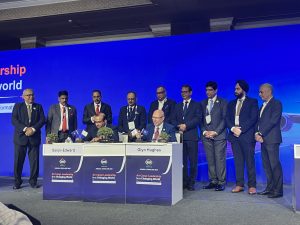Thiruvananthapuram and Kochi have been selected by the Department for Promotion of Industry and Internal Trade (DPIIT) from over 50 tier-2 and tier-3 cities across the country for the preparation of city logistics plans to reduce logistics costs, congestion and improve connectivity. “The State government has now proposed the Directorate of Urban Affairs as the nodal agency for coordinating activities related to the city logistics plans,” said reports. The city logistics plans are expected to be a comprehensive framework designed to optimise urban goods movement, reduce costs and minimise environmental impact. It will be a strategic plan designed to adequately address the urban freight and logistics needs of the city’s population and businesses to achieve economic growth with better quality of life and environment. The logistics plan will be prepared in a structure and format that can be easily integrated with the Comprehensive Mobility Plan (CMP) of the city. One of the focus areas will be in reducing urban emissions by optimising vehicle movement within cities through strategic routing and consolidation of freight. The plan will also prioritise efficiency by optimising goods movement, added reports.
Read More »KSH Infra plans to invest ₹550 crore in logistics park in Tamil Nadu
KSH INFRA announced plans to invest ₹550 crore in its second Park in Tamil Nadu. Strategically located in the high-growth Sriperumbudur-Oragadam belt, the upcoming park will be spread across approximately 60 acres of freehold land, offering a development potential of 1.6 million square feet. Situated with 600 meters of direct frontage on the abutting Other District Road, the park benefits from robust multimodal access. Its proximity to the Chennai–Bangalore Expressway (NE7), which is nearing completion, ensures fast-tracked connectivity to major industrial hubs, ports, and consumption centers, enabling manufacturing and allied industries. The Sriperumbudur–Oragadam corridor is already home to industry giants such as Hyundai, Danfoss, Flowserve, Essar Steel, Apollo Tyres, CEAT, Michelin, JK Tyre, Bridgestone, MRF, Foxconn, Flextronics, Dell, Samsung, Nokia, Salcomp, Jabil, the location is fast evolving into a multi-sectoral industrial cluster. The corridor’s strategic importance is further underscored by large-scale infrastructure developments currently underway, including the Chennai–Bangalore Expressway, Peripheral Ring Road, Greenfield Airport at Parandur, MMLP at Mappedu, and the Aerospace Park in Sriperumbudur. Together, these developments position the region as a high-potential node within the Chennai–Bangalore Industrial Corridor (CBIC). Additionally, the industrial-first development by KSH INFRA will cater to the evolving needs of global and domestic manufacturers, particularly across the automotive, electronics, and engineering sectors. Construction is planned to commence by March–April 2026 and is expected to generate over 1,500 jobs opportunities in the region.
Read More »GHIAL acquires 70% stake in ESR Logistics park to develop airport land
GMR Hyderabad International Airport (GHIAL), an arm of GMR Airports (GAL), acquired a 70 per cent stake in ESR GMR Logistics Park for a consideration of ₹41 crore. GMR Group now owns 100 per cent of EGLPPL, as GMR Hyderabad Aerotropolis Ltd, a wholly owned subsidiary of GHIAL, already owned the rest 30 per cent in EGLPPL, said reports. GMR Group said it aims to accelerate airport land development in Hyderabad. GHIAL CEO Pradeep Panicker said consolidation will enable the company to fully integrate EGLPPL into their ALD strategy. Aman Kapoor, CEO, ALD, GMR Group, said acquisition will help group build an airport-led industrial and logistics ecosystem.
Read More »ACFI, TIACA sign MoU to foster innovation in air cargo landscape
Air Cargo Forum India (ACFI) and The International Air Cargo Association (TIACA) officially signed an MoU aimed at fostering innovation, collaboration and resilience in the global air cargo landscape, at the recently concluded ACFI Annual Conclave in New Delhi. This strategic partnership marks a new chapter in aligning India’s air cargo sector with international best practices, knowledge exchange and sustainable growth.
Read More »Meghalaya ferries heavy Pineapple shipment to Dubai
In a boost for India’s perishables export and agri-logistics sector, Meghalaya flagged off a 2-tonne consignment of premium organic pineapples to Lulu Retail, Dubai. Union Finance Minister Nirmala Sitharaman, lauding the state’s growing role in global supply chains, says, “This reflects Meghalaya’s capacity to deliver high-value organic produce internationally.” The shipment, part of the Megha-LAMP initiative, highlights emerging opportunities for cold-chain logistics and Northeast India’s integration into the global horticultural export network.
Read More »‘Tech crucial to manage capacity during peak season’
Managing capacity during peak seasons or sudden demand surges—be it festivals, e-commerce booms, trade war, or geopolitical disruptions—requires a proactive, data-driven approach,” said Abhishek Goyal, CEO and ED, Aeroprime Group. He added, “Across our operations, we leverage historical trends, real-time market intelligence and close coordination with our airline partners to forecast and respond to fluctuations in demand. In cargo, this includes optimising load planning, securing additional capacity where possible, and offering flexible booking solutions to accommodate time-sensitive shipments. Technology enables us to track demand shifts in real time, helping us reallocate resources swiftly and effectively. Ultimately, it’s our blend of foresight, agility, and strong industry relationships that enables us to navigate high-pressure situations while ensuring continuity and reliability for our clients.
Read More »‘ With converted freighters and increased bellylift, airlines are meeting growing domestic demand’
Rajen Bhatia, Chairman, Western Region ACAAI said, “EXIM Uncertainty because of Geopolitical tensions and shifting trade policies strain cross-border flows—pushing agents toward more dependable domestic routes. Initiatives like UDAN/KrishiUDAN and National Logistics Policy are boosting regional connectivity and cargo handling capability. With converted freighters and increased bellylift, airlines are meeting growing domestic demand caps.”
Read More »‘Bonded-warehouse stockpiling is being used to buffer against EXIM disruptions’
Vipin Vohra, Chairman, Continental Carriers said, “Air cargo agents are pivoting to strengthen domestic networks by establishing regional consolidation hubs and flexible feeder services. They’re forging partnerships with e-commerce and express-delivery platforms, investing in dedicated trucking links and leveraging the expanding railway cargo network to enhance connectivity and cost-efficiency. Bonded-warehouse stockpiling is being used to buffer against EXIM disruptions. Many are also reconfiguring capacity planning, deploying tech-enabled cargo visibility tools, and aligning with domestic carriers to ensure resilience and quicker response to shifting market demands.”
Read More »‘This shift is part of broader transformation to stay adaptable & relevant’
Balagopal Balachandran, National Head – Air Freight, FEI Cargo said, “While the world contends with slowing growth, trade wars and geopolitical uncertainty, India is quietly building something far more resilient – it’s domestic market. “Local is the new Global.” India’s private consumption has doubled over the decades , rising from $1 trillion in 2013 to approx. $2.1 trillion in 2024. A rising urban middle class , growing appetite for faster services and the localisation of global supply chain are accelerating demand for domestic air cargo . Organisations that once chased global revenues are now doubling down on Indian soil and honestly It’s working. With geopolitical tensions impacting global supply chains and EXIM trade flows, Indian air cargo agents are strategically depending towards the domestic cargo market. This shift is not merely reactive but part of a broader transformation to stay adaptable and relevant. Agents are realigning networks to serve Tier 2 and 3 cities forming strategic tie ups with regional and low-cost carriers to optimise domestic air space and ensuring faster turnarounds. There is growing investment in express logistics , temp controlled shipments, and airport-based consolidation centres to support time sensitive goods. Some leading agents are even developing domestic distribution hubs, positioning themselves as integral link in India’s consumption driven growth story . By diversifying into domestic cargo, agents are not just hedging against EXIM volatility but also tapping into India’s rapidly growing internal economy.”
Read More »‘Agents tapping on growing potential of domestic express cargo business’
Sunil Kohli, MD, Rahat Cargo said, “To overcome the EXIM trade uncertainties, the agents are trying their best to collaborate with e-commerce companies while focusing on developing the specialised services of assorted kind. The agents are further diversifying into high-value, time-sensitive goods such as pharmaceuticals, perishables (e.g., fresh produce, seafood)within the domestic sector. The agents remain responsive to changes in global trade patterns including the impact of tariffs, trade agreements, and geopolitical events on their operations. Amid a highly competitive trade scenario, the agents do their bests to provide excellent customer service which includes real-time tracking and proactive communication in order to strengthen the loyalty factor among the clients.
Read More » Cargo Breaking News
Cargo Breaking News









